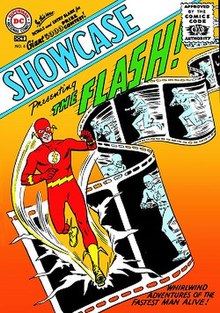
Showcase (comics)
| Showcase | |
|---|---|
 Showcase #4, featuring the Silver Age Flash, art by Carmine Infantino. | |
| Publication information | |
| Publisher | DC Comics |
| Schedule | Bimonthly |
| Format | Ongoing |
| Publication date | March 1956 – September 1970 August 1977 – September 1978 |
| No. of issues | 104 |
| Main character(s) | Challengers of the Unknown Flash Green Lantern Lois Lane Space Ranger Adam Strange |
| Creative team | |
| Written by | Sergio Aragonés, Otto Binder, E. Nelson Bridwell, John Broome, Arnold Drake, Gardner Fox, Edmond Hamilton, Bob Haney, Robert Kanigher, Jack Kirby, Jack Miller, Don Segall, Steve Skeates |
| Artist(s) | Murphy Anderson, Ross Andru, Bob Brown, Nick Cardy, Steve Ditko, Russ Heath, Carmine Infantino, Gil Kane, Jack Kirby, Joe Kubert, Ruben Moreira, Win Mortimer, Bob Oksner, Joe Orlando, John Prentice, Mike Sekowsky |
Showcase is a comic anthology series published by DC Comics. The general theme of the series was to feature new and minor characters as a way to gauge reader interest in them, without the difficulty and risk of featuring untested characters in their own ongoing titles. Showcase is regarded as the most successful of such tryout series, having been published continuously for more than 14 years, launching numerous popular titles, and maintaining a considerable readership of its own. The series ran from March–April 1956 to September 1970, suspending publication with issue #93, and then was revived for eleven issues from August 1977 to September 1978.

Original series
Showcase featured characters in either one-shot appearances or brief two- or three-issue runs as a way to determine reader interest, without the financial risk of featuring "untested" characters in their own ongoing titles.[1] The series began in March–April 1956[2] and saw the first appearance of several major characters including the Silver Age Flash, the Challengers of the Unknown, Space Ranger, Adam Strange, Rip Hunter, the Silver Age Green Lantern, the Sea Devils, the Silver Age Atom, the Metal Men, the Inferior Five, the Creeper, Anthro, Hawk and Dove, Angel and the Ape, the Silver Age Spectre, and Bat Lash.

In 1962, DC purchased an adaptation of the James Bond novel and film Dr. No, which had been published in British Classics Illustrated, and published it as an issue of Showcase. It was the first American comic book appearance of the character.

Showcase stood out from other tryout series in that it maintained its own readership; readers who liked a feature would buy the series when it came out, but would often continue buying Showcase as well.[3] The series was canceled in 1970 with issue #93,[4] featuring Manhunter 2070.

Full list of issues
| Issue # | Character | Notes |
|---|---|---|
| 1 | The Fire Fighters | |
| 2 | The Kings of the Wild | |
| 3 | The Frogmen | |
| 4 | The Flash (Barry Allen) | DC editor Julius Schwartz assigned writer Robert Kanigher and artists Carmine Infantino and Joe Kubert to the company's first attempt at reviving superheroes: an updated version of the Flash that would appear in Showcase #4 (October 1956).[5] The eventual success of the new, science-fiction oriented Flash heralded the wholesale return of superheroes, and the beginning of what fans and historians call the Silver Age of Comic Books.[6] |
| 5 | The Manhunters | |
| 6–7 | The Challengers of the Unknown | Created by Jack Kirby.[7] |
| 8 | The Flash (Barry Allen) | |
| 9–10 | Lois Lane | Lois Lane was featured in a tryout for her own series.[8] |
| 11–12 | The Challengers of the Unknown | |
| 13–14 | The Flash (Barry Allen) | |
| 15–16 | Space Ranger | Created by Gardner Fox, Edmond Hamilton and Bob Brown.[9][10] |
| 17–19 | Adventures on Other Worlds (Adam Strange) | Adam Strange was created by Gardner Fox and Mike Sekowsky.[11] |
| 20–21 | Rip Hunter, Time Master | Created by Jack Miller and Ruben Moreira.[12] |
| 22–24 | Green Lantern (Hal Jordan) | The Silver Age Green Lantern was launched by John Broome and Gil Kane.[13][14] |
| 25–26 | Rip Hunter, Time Master | |
| 27–29 | The Sea Devils | Robert Kanigher and Russ Heath created the Sea Devils, a team of scuba-diving adventurers.[15] |
| 30–33 | Aquaman and Aqualad | |
| 34–36 | The Atom (Ray Palmer) | The Silver Age Atom was created by Gardner Fox and Gil Kane.[16] |
| 37–40 | The Metal Men | Robert Kanigher and artist Ross Andru co-created the Metal Men.[17] |
| 41–42 | Tommy Tomorrow of the Planeteers | |
| 43 | James Bond (adaptation of Dr. No) | Comic book adaptation of the 1962 James Bond film.[18] |
| 44 | Tommy Tomorrow of the Planeteers | |
| 45 | Sgt. Rock | |
| 46–47 | Tommy Tomorrow of the Planeteers | |
| 48–49 | Cave Carson: Adventures Inside Earth | |
| 50–51 | I—Spy | |
| 52 | Cave Carson: Adventures Inside Earth | |
| 53–54 | G.I. Joe | [19] |
| 55–56 | Doctor Fate and the Hourman | |
| 57–58 | The Enemy Ace | |
| 59 | The Teen Titans | |
| 60–61 | The Spectre | Revival of the character by Gardner Fox and Murphy Anderson.[20] |
| 62–63 | The Inferior Five | E. Nelson Bridwell and Joe Orlando created the Inferior Five.[21] |
| 64 | The Spectre | |
| 65 | The Inferior Five | |
| 66–67 | B'wana Beast | Bob Haney and Mike Sekowsky created B'wana Beast.[22] |
| 68–69 | The Maniaks | A fictional rock band published by created by E. Nelson Bridwell and Mike Sekowsky. |
| 70 | Leave It to Binky | |
| 71 | The Maniaks with Woody Allen | |
| 72 | Top Gun | |
| 73 | Beware the Creeper | Steve Ditko created the Creeper with scripter Don Segall.[23] |
| 74 | Anthro | |
| 75 | The Hawk and the Dove | Steve Ditko created the quirky team of superhero brothers called the Hawk and the Dove with writer Steve Skeates.[24] |
| 76 | Bat Lash | Western character by Nick Cardy and Sergio Aragonés.[25] |
| 77 | Angel and the Ape | E. Nelson Bridwell and Bob Oksner created Angel and the Ape.[26] |
| 78 | Jonny Double | |
| 79 | The Dolphin | |
| 80 | The Phantom Stranger | Reprints from The Phantom Stranger (vol. 1) #2 and Star Spangled Comics #122, with a new framing story by Mike Friedrich and Jerry Grandenetti.[27] |
| 81 | The Way-Out World of Windy and Willy | |
| 82–84 | Nightmaster | |
| 85–87 | Firehair | |
| 88–90 | Jason's Quest | |
| 91–93 | Manhunter 2070 |
Reprint collections
In 1992, DC Comics published a trade paperback reprint collection titled The Essential Showcase: 1956–1959 (ISBN 978-1563890796). This collection reprints selected stories/characters from issues #1, 4, 6, 9, 11, 13, and 17 of the original Showcase series. Several other issues were included in other reprint collections.

| Title | Issues collected | Publication date | ISBN |
|---|---|---|---|
| Showcase Presents: Showcase Vol.1 | #1–21 | July 2012 | 1-4012-3523-9 |
| Showcase Presents: The Flash Vol. 1 | #4, 8, 13–14 | May 2007 | 1-4012-1327-8 |
| Vol. 1 | #4, 8, 13–14 | May 1998 | 978-1563891397 |
| The Flash Chronicles Vol. 1 | #4, 8, 13–14 | September 2009 | 978-1401224714 |
| Flash Rogues: Captain Cold | #8 | August 2018 | 978-1401281595 |
| Showcase Presents: Superman Family Vol. 1 | #9 (Lois Lane solo story) | March 2006 | 1-4012-0787-1 |
| Showcase Presents: Superman Family Vol. 2 | #10 (Lois Lane solo story) | February 2008 | 1-4012-1656-0 |
| Showcase Presents: Challengers of the Unknown Vol. 1 | #6–7, 11–12 | September 2006 | 1-4012-1087-2 |
| Challengers of the Unknown Archives Vol. 1 | #6–7, 11–12 | July 2003 | 1-5638-9997-3 |
| Adam Strange Archives Vol. 1 | #17–19 | March 2004 | 1-4012-0148-2 |
| Showcase Presents: Rip Hunter, Time Master Vol. 1 | #20–21, 25–26 | August 2012 | 1-4012-3521-2 |
| Showcase Presents: Green Lantern Vol. 1 | 22–24 | October 2005 | 1-4012-0759-6 |
| Green Lantern Archives Vol. 1 | 22–24 | 1993 | 978-1563890871 |
| The Green Lantern Chronicles Vol. 1 | #22–24 | May 2009 | 978-1401221638 |
| Showcase Presents: Sea Devils, Vol. 1 | #27–29 | July 2012 | 1-4012-3522-0 |
| Aquaman Archives Vol. 1 | #30–31 | February 2003 | 978-1563899430 |
| Showcase Presents: The Atom Vol. 1 | #34–36 | June 2007 | 1-4012-1363-4 |
| The Atom Archives Vol. 1 | #34–36 | July 2001 | 978-1563897177 |
| Showcase Presents: Metal Men Vol. 1 | #37–40 | September 2007 | 1-4012-1559-9 |
| Metal Men Archives Vol. 1 | #37–40 | May 2006 | 1-4012-0774-X |
| Crisis on Multiple Earths: The Team-Ups Vol. 1 | #55–56 | January 2006 | 978-1401204709 |
| Showcase Presents: Enemy Ace Vol. 1 | #57–58 | February 2008 | 1-4012-1721-4 |
| Showcase Presents: Teen Titans Vol. 1 | #59 | April 2006 | 1-4012-0788-X |
| Silver Age Teen Titans Archives Vol. 1 | #59 | October 2003 | 978-1-4012-0071-8 |
| Showcase Presents: The Spectre Vol. 1 | #60–61, 64 | May 2012 | 1-4012-3417-8 |
| The Creeper by Steve Ditko | #73 | April 2010 | 978-1401225919 |
| Showcase Presents: Bat Lash Vol. 1 | #76 | July 2009 | 1-4012-2295-1 |
| Showcase Presents: Phantom Stranger Vol. 1 | #80 | October 2006 | 1-4012-1088-0 |
Revival
In August 1977, Showcase was revived for 11 issues[28] after the cancellation of 1st Issue Special, which ran from 1975 to 1976. Writer Paul Kupperberg reminisced: "1977 was an expansionary time at DC, and Jenette Kahn was supportive of trying new things. There were a lot of new ideas being thrown around at that time. A lot of books came around, lasted a few issues, and then went away. [DC] decided to create Showcase for the very same reason it was originally created, to have a place to experiment, and if [the feature] sold, great. If not, they were already on to the next idea".[emphasis in original][29]

The revived Showcase, using the original numbering, began with issue #94 and published the first appearance of the new Doom Patrol[30] and the solo adventures of Power Girl.[29] Issue #100 (May 1978) had a cameo by almost every character that had premiered in the original run of Showcase in a story co-written by Paul Kupperberg and Paul Levitz and drawn by Joe Staton.[31] The series was cancelled again after issue #104 (September 1978), as part of what is commonly called the "DC Implosion".[29] Issues #105 and #106 saw print in Cancelled Comic Cavalcade and #105 was later published in Adventure Comics. Issue #106 was included in The Creeper by Steve Ditko hardcover collection published by DC in 2010.[32] Two other series were announced before the series cancellation: The Huntress, which would have spun out of her feature in Batman Family; and World of Krypton, which was published as DC's first miniseries in 1979.[33] According to editor Paul Levitz, at the time of the cancellation there were still no Huntress stories in production, and the slated content for Showcase #107–109 was Gerry Conway's Western adventure The Deserter.[29]

Full list of issues
| Issue # | Character |
|---|---|
| 94–96 | The Doom Patrol |
| 97–99 | Power Girl |
| 100 | Special issue featuring almost every character from issues #1–93. |
| 101–103 | Hawkman |
| 104 | OSS / Spies at War |
| 105 | Deadman |
| 106 | The Creeper |
Reprint collections
| Title | Issues collected | Publication date | ISBN |
|---|---|---|---|
| Power Girl | #97–99 | June 2006 | 978-1401209681 |
| The Creeper by Steve Ditko | unpublished issue #106 | April 2010 | 978-1401225919 |
New Talent Showcase
DC published New Talent Showcase, which ran for 15 issues (Jan. 1984 – March 1985),[34] briefly changed its title to Talent Showcase, and then ended with issue #19 (Oct. 1985).[35] For the most part edited by Karen Berger (and for a short time by Sal Amendola), the series gave new writers and artists their first professional opportunity in the comics industry. Notable creators who made their DC debuts with New Talent Showcase include Mark Beachum, Norm Breyfogle, Tom Grindberg, Steve Lightle, Mindy Newell, and Stan Woch.[36] Per editorial policy, the series featured only new characters.[36]

Showcase '93-'96
DC revived the Showcase title in 1993 when the 1950s retailer reluctance to order new, untested series had largely vanished, and was replaced in the 1990s with reader enthusiasm for the "#1" issues of new series. The new series was published as Showcase '93, a monthly 12-issue miniseries, replaced yearly by Showcase '94, '95 and '96, each one also a miniseries lasting 12 issues.

For the first two years (1993–1994), Showcase featured characters and concepts from the Batman family of titles with an emphasis on villain-centric one-off stories. The 1994 Azrael series launched out of Showcase '94 with #10 while a prototype story for what became the Birds of Prey ongoing appeared in Showcase '96 #3. The series also had a series of crossover tie-ins. Showcase '93 had a two-part crossover with the "Knightfall Saga" set while Batman recovered from having his back broken by Bane, which revealed a previously untold story from earlier in the "Knightfall" storyline where Batman fought Two-Face. Showcase '94 #4-5 were part of a crossover with Robin, involving Tim Drake and Huntress fighting a masked priest/vigilante attempting to eliminate his evil mob boss sister's criminal empire. Showcase '94 #8-9 featured a prelude to "Zero Hour Crisis In Time" that featured Monarch's transformation into Extant and #10 featured a crossover story involving Clock King fighting a series of temporal dopplegangers during "Zero Hour" while trying to obtain a powerful time travel artifact.

With the 1995-1996 Showcase series, the focus switched from Batman centric characters to Superman centric characters. This included a story involving the Matrix Supergirl that led into her ongoing series written by Peter David (Showcase '96 #8) and a two-part story involving the Post-Zero Hour Legion of Super-Heroes (#11-12) which featured the first post-Zero Hour meeting of Brainiac 5 and his ancestor Vril Dox and the villain Brainiac, which ultimately served as the final storyline as the series was canceled with #12.

Showcase Presents
In 2005, DC began publishing thick, black-and-white reprints of older material under the umbrella title Showcase Presents.

References
- ^ Daniels, Les (1995). "Flashback The Return of the Super Hero". DC Comics: Sixty Years of the World's Favorite Comic Book Heroes. New York, New York: Bulfinch Press. p. 116. ISBN 0821220764.
In those troubled times [of the 1950s], launching a new character was a risky proposition...So DC had inaugurated Showcase, which provided an entirely new feature in each issue, thus minimizing the risk of publishing something unpopular.
- ^ Showcase at the Grand Comics Database
- ^ Cassell, Dewey (April 2014). "Marvel Feature". Back Issue! (71). Raleigh, North Carolina: TwoMorrows Publishing: 14.
- ^ Sacks, Jason; Dallas, Keith (2014). American Comic Book Chronicles: The 1970s. TwoMorrows Publishing. p. 13. ISBN 978-1605490564.
- ^ Levitz, Paul (2010). "The Silver Age 1956–1970". 75 Years of DC Comics The Art of Modern Mythmaking. Cologne, Germany: Taschen. p. 251. ISBN 9783836519816.
Together Schwartz, Kanigher, Infantino, and Kubert would set a tone for the Flash that was both cinematic...and influenced by Schwartz's first love of science fiction.
- ^ Irvine, Alex (2010). "1950s". In Dolan, Hannah (ed.). DC Comics Year By Year A Visual Chronicle. London, United Kingdom: Dorling Kindersley. p. 80. ISBN 978-0-7566-6742-9.
The arrival of the second incarnation of the Flash in [Showcase] issue #4 is considered to be the official start of the Silver Age of comics.
- ^ Irvine "1950s" in Dolan, p. 84: "Kirby's first solo project was a test run of a non-super hero adventure team called Challengers of the Unknown. Appearing for the first time in Showcase #6, the team would make a few more Showcase appearances before springing into their own title in May 1958".
- ^ Irvine "1950s" in Dolan, p. 85: "The future title Superman's Girl Friend, Lois Lane got a tryout in issues #9 and #10 of Showcase, when Lois Lane stepped in as the lead feature".
- ^ Irvine "1950s" in Dolan, p. 91: "Space Ranger...debuted in Showcase #15 in stories by writer Edmond Hamilton and artist Bob Brown".
- ^ Markstein, Don (2008). "Space Ranger". Don Markstein's Toonopedia. Retrieved October 18, 2012.
Editor Jack Schiff took charge of the character, and handed him over to writers Edmond Hamilton and Gardner Fox for development. Bob Brown illustrated their script.
- ^ Irvine "1950s" in Dolan, p. 91: "Adam Strange debuted in a three-issue trial starting with Showcase #17, which was written by Gardner Fox and featured art by Mike Sekowsky".
- ^ Irvine "1950s" in Dolan, p. 94: "Rip Hunter and the Time Masters...made their debut in Showcase #20...by writer Jack Miller and artist Ruben Moreira".
- ^ Irvine "1950s" in Dolan, p. 95: "DC had decided to revamp a number of characters to inject new life into the genre. Writer John Broome and artist Gil Kane ensured that Green Lantern got his turn in October's Showcase #22".
- ^ Levitz "The Silver Age 1956–1970", p. 252: "Schwartz enlisted Broome to update Green Lantern...He got a quick Showcase try before launching on his own even before sales figures came in".
- ^ McAvennie, Michael "1960s" in Dolan, p. 101: "Showcase #27 in August [1960] saw Dane Dorrance, Biff Bailey, Judy Walton, and Nicky Walton dive into underwater adventures as the Sea Devils, by writer Robert Kanigher and illustrator Russ Heath".
- ^ McAvennie "1960s" in Dolan, p. 103: "The Atom was the next Golden Age hero to receive a Silver Age makeover from writer Gardner Fox and artist Gil Kane".
- ^ McAvennie "1960s" in Dolan, p. 105: "Writer/editor Robert Kanigher and artist Ross Andru put a then-modern-day spin on robots with the exploits of comics' first "heavy metal" group, the Metal Men".
- ^ McAvennie "1960s" in Dolan, p. 109: "British publisher Gilberton Publications...approached DC Comics about publishing its adaptation of Ian Fleming's bestselling novel Dr. No in the U.S. The movie of the novel was a box-office smash in the U.K., so DC agreed to publish the James Bond story".
- ^ McAvennie "1960s" in Dolan, p. 113: "Less than nine months since G.I. Joe ushered in the era of the action figure, Hasbro's incredibly popular war hero enlisted for some action in the pages of Showcase".
- ^ McAvennie "1960s" in Dolan, p. 117: "Scribe Gardner Fox and artist Murphy Anderson recruited the ethereal entity in time for #60 of Showcase".
- ^ McAvennie "1960s" in Dolan, p. 117: "Writer E. Nelson Bridwell and artist Joe Orlando knew what was in a name when they unleashed the Inferior Five in Megalopolis".
- ^ McAvennie "1960s" in Dolan, p. 123: "Africa found itself a helmeted, loinclothed champion of mammals when scribe Bob Haney and artist Mike Sekowsky presented B'wana Beast".
- ^ McAvennie "1960s" in Dolan, p. 129: "Writer/artist Steve Ditko and co-scripter Don Segall gave [character Jack Ryder] more than the last laugh as the garishly garbed Creeper, one of DC's quirkiest protagonists".
- ^ McAvennie "1960s" in Dolan, p. 130: "Brothers Hank and Don Hall were complete opposites, yet writer/artist Steve Ditko with scripter Steve Skeates made sure the siblings shared a desire to battle injustice as Hawk and Dove".
- ^ Coates, John (1999). "1968–75: Bat Lash, covers & more...". The Art of Nick Cardy. Coates Publishing. pp. 62–66. ISBN 1-887591-22-2.
- ^ McAvennie "1960s" in Dolan, p. 130: "[E. Nelson Bridwell] and artist Bob Oksner injected pretty primitive humor into the classic 'beauty and the beast' concept when they opened the O'Day and Simeon Detective Agency for business".
- ^ "Showcase #80". Grand Comics Database.
- ^ Showcase revival at the Grand Comics Database
- ^ a b c d Johnson, Dan (April 2014). "Showcase Presents... Again". Back Issue! (71). Raleigh, North Carolina: TwoMorrows Publishing: 50–55.
- ^ McAvennie "1970s" in Dolan, p. 175: "Writer Paul Kupperberg and artist Joe Staton revived DC's "try-out" series from its seven-year slumber by resurrecting the super-hero team, Doom Patrol".
- ^ Pigott, Mike (December 2013). "Showcase Centenary A Look at the Landmark 100th Issue of DC's Tryout Comic, Showcase". Back Issue! (69). Raleigh, North Carolina: TwoMorrows Publishing: 38–40.
- ^ Ditko, Steve (2010). The Creeper by Steve Ditko. DC Comics. p. 288. ISBN 978-1-4012-2591-9.
- ^ McAvennie "1970s" in Dolan, p. 181: "The worldwide success of Superman: The Movie motivated [DC] to publish more Superman-related titles. With that, editor E. Nelson Bridwell oversaw a project that evolved into comics' first official limited series – World of Krypton...Featuring out-of-this-world artwork from Howard Chaykin, [Paul] Kupperberg's three-issue limited series explored Superman's homeworld".
- ^ New Talent Showcase at the Grand Comics Database
- ^ Talent Showcase at the Grand Comics Database
- ^ a b Greenberger, Robert (April 2014). "New Talent and Bonus Babies". Back Issue! (71). Raleigh, North Carolina: TwoMorrows Publishing: 65–71.
External links
- Showcase at the Comic Book DB (archived from the original)
- New Talent Showcase at the Comic Book DB (archived from the original)
- Showcase '93 at the Comic Book DB (archived from the original)
- Showcase #55: The Glory of Murphy Anderson
- Comics magazines published in the United States
- 1956 comics debuts
- 1970 comics endings
- 1977 comics debuts
- 1978 comics endings
- 1984 comics debuts
- 1985 comics endings
- 1993 comics debuts
- 1993 comics endings
- 1994 comics debuts
- 1994 comics endings
- 1995 comics debuts
- 1995 comics endings
- 1996 comics debuts
- 1996 comics endings
- Comics by Arnold Drake
- Comics by Bob Haney
- Comics by Dennis O'Neil
- Comics by Gardner Fox
- Comics by Jack Kirby
- Comics by Paul Kupperberg
- Comics by Paul Levitz
- Comics by Peter J. Tomasi
- Comics by Robert Kanigher
- Comics by Steve Ditko
- DC Comics limited series
- DC Comics titles
- Defunct American comics
- Magazines established in 1956
- Magazines disestablished in 1970
- Magazines established in 1977
- Magazines disestablished in 1978
- Magazines established in 1984
- Magazines disestablished in 1985
- Magazines established in 1993
- Magazines disestablished in 1993
- Magazines established in 1994
- Magazines disestablished in 1994
- Magazines established in 1995
- Magazines disestablished in 1995
- Magazines established in 1996
- Magazines disestablished in 1996
- Superhero comics
See what we do next...
OR
By submitting your email or phone number, you're giving mschf permission to send you email and/or recurring marketing texts. Data rates may apply. Text stop to cancel, help for help.
Success: You're subscribed now !
